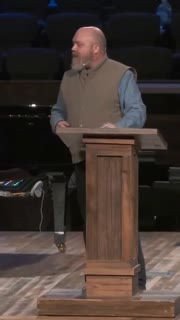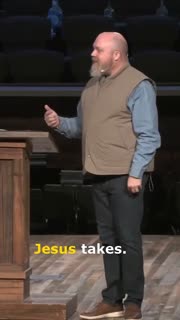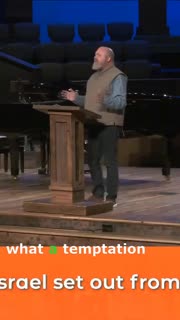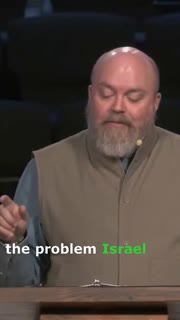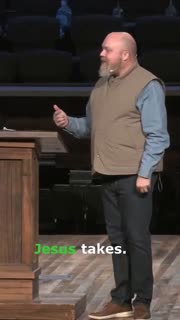Transforming Bitterness: Trusting God as Our Healer
Devotional
Sermon Summary
Bible Study Guide
Sermon Clips
### Quotes for Outreach
1. "The Lord says, I invite you to stop railing against your situation. To stop railing against the people that you think are leading you. Whatever it is in your life. Stop railing against it. And begin to call on the name of the Lord." (21 seconds)
2. "God will take us on a journey where he can reveal to us the truth. And the journey might not be what we would consider to be a direct route. It might not be comfortable to us. It might not be easy to us, but it will be the path that he takes us on." (22 seconds)
3. "Friends, the Lord says, I invite you to stop railing against your situation. To stop railing against the people that you think are leading you. Whatever it is in your life. Stop railing against it. And begin to call on the name of the Lord." (21 seconds)
4. "Jesus takes the bitterness and transforms it into sweet, life-giving water. And returns it to us. I am the Lord, your healer. Friends, God has called you to a life of freedom. And his path, though at times difficult, is leading you that way." (44 seconds)
5. "The Lord's invitation this morning is to come. Bring him the bitter waters. Look to him. Look to him. Say well I've tried that. Keep going. And have you told him. And you're mad. That it hasn't worked. Start there. That's a great place to start. Start there. Bring your bitter water. And let him heal it." (37 seconds)
### Quotes for Members
1. "What a temptation isn't it to stop where God once did something and to just sit there and say isn't that amazing what God did you know and it was amazing God did this a year ago that's amazing and then before you know it you're talking about what God did five years ago and then 10 years ago and then 20 years ago then 30 years ago then 40 years ago then 50 years ago and at some point somebody says okay that's I'm so glad that God did that for me I'm so glad that God did that for me 50 years ago but what is he doing now it seems to me that the cloud is moving on somebody's gonna have to make us move on it's not easy is it but you gotta do it sometimes." (48 seconds)
2. "The problem Israel needed to get out of was not merely Egyptian bondage they did not know God and beyond that they were not ready to experience his presence among them so they travel down this route they go three days without water probably by this point the water stores that they have reserved that maybe they'd picked up around the Red Sea crossing the water stores that they had reserved are now run out and they're needing to find fresh water sources." (36 seconds)
3. "God led them out of Egypt and down this road, the Sinai Peninsula, into the wilderness, led them where they ran out of water, and led them to a place where they thought they found water, but they couldn't drink it. God led them there. Here he would reveal Israel to themselves, and he would reveal himself to them. That's what we're going to look at this morning, how God reveals Israel to himself, reveals himself to us, and then we're going to take that double-edged revelation and bring it home here to where we are." (44 seconds)
4. "The Lord says I'm going to lead you into the wilderness. And I'm going to bring you to this place of bitter water. Not to punish you. Not to harm you. But to show you. I'm your healer. He will take us down roads. To show us his kindness." (26 seconds)
5. "Jesus takes the bitterness and transforms it into sweet, life-giving water. And returns it to us. I am the Lord, your healer. Friends, God has called you to a life of freedom. And his path, though at times difficult, is leading you that way. The Lord invites you this morning. To see him not as your enemy. But as your healer." (44 seconds)
Ask a question about this sermon
1. "The Lord says, I invite you to stop railing against your situation. To stop railing against the people that you think are leading you. Whatever it is in your life. Stop railing against it. And begin to call on the name of the Lord." (21 seconds)
2. "God will take us on a journey where he can reveal to us the truth. And the journey might not be what we would consider to be a direct route. It might not be comfortable to us. It might not be easy to us, but it will be the path that he takes us on." (22 seconds)
3. "Friends, the Lord says, I invite you to stop railing against your situation. To stop railing against the people that you think are leading you. Whatever it is in your life. Stop railing against it. And begin to call on the name of the Lord." (21 seconds)
4. "Jesus takes the bitterness and transforms it into sweet, life-giving water. And returns it to us. I am the Lord, your healer. Friends, God has called you to a life of freedom. And his path, though at times difficult, is leading you that way." (44 seconds)
5. "The Lord's invitation this morning is to come. Bring him the bitter waters. Look to him. Look to him. Say well I've tried that. Keep going. And have you told him. And you're mad. That it hasn't worked. Start there. That's a great place to start. Start there. Bring your bitter water. And let him heal it." (37 seconds)
### Quotes for Members
1. "What a temptation isn't it to stop where God once did something and to just sit there and say isn't that amazing what God did you know and it was amazing God did this a year ago that's amazing and then before you know it you're talking about what God did five years ago and then 10 years ago and then 20 years ago then 30 years ago then 40 years ago then 50 years ago and at some point somebody says okay that's I'm so glad that God did that for me I'm so glad that God did that for me 50 years ago but what is he doing now it seems to me that the cloud is moving on somebody's gonna have to make us move on it's not easy is it but you gotta do it sometimes." (48 seconds)
2. "The problem Israel needed to get out of was not merely Egyptian bondage they did not know God and beyond that they were not ready to experience his presence among them so they travel down this route they go three days without water probably by this point the water stores that they have reserved that maybe they'd picked up around the Red Sea crossing the water stores that they had reserved are now run out and they're needing to find fresh water sources." (36 seconds)
3. "God led them out of Egypt and down this road, the Sinai Peninsula, into the wilderness, led them where they ran out of water, and led them to a place where they thought they found water, but they couldn't drink it. God led them there. Here he would reveal Israel to themselves, and he would reveal himself to them. That's what we're going to look at this morning, how God reveals Israel to himself, reveals himself to us, and then we're going to take that double-edged revelation and bring it home here to where we are." (44 seconds)
4. "The Lord says I'm going to lead you into the wilderness. And I'm going to bring you to this place of bitter water. Not to punish you. Not to harm you. But to show you. I'm your healer. He will take us down roads. To show us his kindness." (26 seconds)
5. "Jesus takes the bitterness and transforms it into sweet, life-giving water. And returns it to us. I am the Lord, your healer. Friends, God has called you to a life of freedom. And his path, though at times difficult, is leading you that way. The Lord invites you this morning. To see him not as your enemy. But as your healer." (44 seconds)


